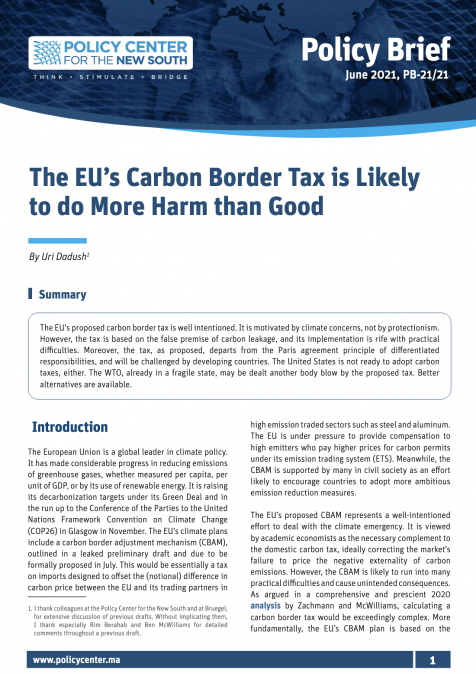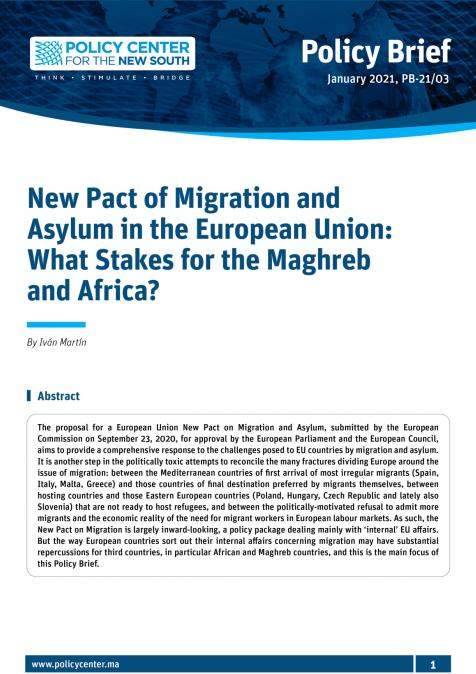Publications /
Opinion
In the upcoming months, European Union (EU) member states and African, Caribbean and Pacific countries (ACP) are expected to adopt a new agreement that will replace the existing Cotonou framework due to expire by February 2020. The ACP Group and the EU respectively adopted the mandates of negotiations in May and June 2018. The beginning of negotiations was scheduled one year earlier but was delayed due to diverging positions on the matter of migration. Consequently, the formal adoption of the successor agreement is likely to witness delays.
in fact, it is not surprising to see divergences emerge around the matter of migration in the post-Cotonou agreement’s negotiations. The context in which the current EU-ACP framework was adopted has changed. Migration indeed positioned itself as a high priority issue for the EU and for several African countries, a trend that is not acutely observed for the Caribbean and Pacific countries. Hence, the negotiators agreed on the necessity to adopt an umbrella agreement that outlines the general principals of the partnership, but that will be divided into three regional pillars (Africa, the Caribbean and the Pacific) taking into account the priority fields of cooperation for each of the aforementioned regions.
Reaching the compromise
Late 2017 the European Commission submitted a proposal to the parliament and the Council for setting the ground of negotiations with ACP countries. Unsurprisingly, the protocol of negotiations with African countries lists migration management as a high priority area, to which an entire article is dedicated. In fact, the reference to migration is not a novelty, since Article 13 of the existing agreement already provides for the promotion of legal migration and commitment in favour of the readmission of both ACP and EU nationals illegally residing in the EU and ACP countries. However, the point of discord was primarily within EU member states, as to the acceptable formulation of the chapter on migration. As expected, the proposal submitted by the Commission reflected largely the existing EU policy, aligning the eradication of the root causes of migration and the necessity to improve readmission policies and border control. In line with the co-decision principal, the mandate is submitted to approval to the parliament and the Council. The European parliament approved the proposal; however, the Council blocked it following the opposition of Hungary. The latter sought that the chapter on migration should include direct reference to security and emphasis on the legal requirement for ACP countries to readmit their nationals. In fact, the Hungarian government questions the whole argument of positive migration, as described in the text of the Commission. Following months of blockage, the first round of official negotiations begun on September 2018 and the compromised mandate contained minor changes to Article 13 of the existing agreement. The most interesting change is noticed in the used terminology, referring to “shared responsibility” and “orderly and regular migration and mobility”. On the question of irregular migration, the text refers to “legal obligation to readmission” as opposed to “accept readmission” in article 13 of the current Cotonou agreement. However, the most controversial third nationals and stateless readmission clause is absent in the negotiation’s directives of the Commission. On the side of the ACP group, migration is cited under the political dialogue section, and the priorities are: voluntary readmission, no linkages between development aid and border control and the ease of diaspora’s remittances transfers.
Evolving context and priorities
The final formulation of chapter VI in the negotiations directives is not only the result of the EU’s compromise policy. In fact, even if Hungary succeeded in imposing the legally binding readmission clause and African countries of the ACP group accepted it, there were only minor chances; this would translate into significant results on the ground. First, although the ACP group counts 48 sub-Saharan African states, big players in the area of migration like Morocco, Tunisia, Libya and Algeria are not part of the group and hence absent in the negotiations table. Second, African countries recently have put in place several attempts to adopt a common agenda on migration. Being rushed into a continental deal with the EU under the auspice of the post Cotonou agreement, might carry the risk to smother these attempts. For the first time an in-depth reflexion on African migration has emerged in the 28th summit of the African Union in Addis-Ababa, under the leadership of Morocco which was designated as the AU’s coordinator on migration and that hosts the headquarters of the African Observatory for Migration. After decades of linear policy making, it is time for African governments to take more initiative in the matter. Finally, one of the biggest hinders to an effective management of migration between the EU and Africa, is the multitude of frameworks and mechanisms that are often confusing for partner countries. Adding the post Cotonou agreement to the list will certainly have adverse effects. To name only the biggest frameworks, we count The European Agenda on Migration, the Valetta Summit, the Emergency Trust for Africa, and before that the Global Approach to Migration and Mobility (GAMM) and the Common Agenda for Migration and Mobility (CAMM). While it could be understandable that each of these instruments serve a particular interest, it is nonetheless worth considering a centralisation of all the existing instruments under one policy framework. The latter can be then subdivided to the widely agreed upon axis of tackling the root causes of migration, curbing illegal migration and improving legal mobility. This would create a better understanding by partner countries and avoid miss-understandings. Ad-hoc measure for crisis situations can be included in a separate framework.
Future perspectives:
While both the EU and ACP countries managed to bypass the migration blockage in the pre-negotiation mandate, there are no guarantees the similar result will be achieved in the final negotiations. Hungary is not the only country that has voiced its scepticism to the migration chapter, Poland is also concerned, and Italy is in ongoing saga with humanitarian NGOs “illegally” accosting in its shores. The most desired outcome for these countries is that irregular migrants be systematically returned to their countries of origin. Hence, there will be certainly attempts to re-emphasize on the readmission mechanisms in the final post Cotonou agreement. From the side of the ACP group, readmission should be only done on voluntary basis and development aid should not be pending on how good a country is doing in terms of re-admission. The stakes of both parts seem to be on the opposing parts of the spectrum. The way out of the deadlock is to put into practice the long-praised principals of shared responsibility and commitments to the respect of the universally admitted principals of valuing human rights regardless of origin and ethnicity.
The opinions expressed in this article belong to the author.








